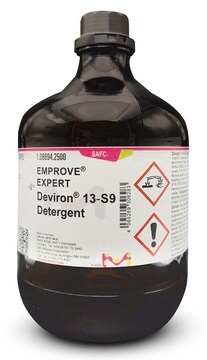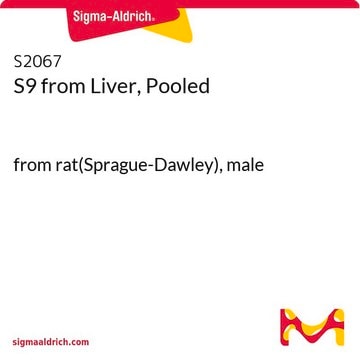A1420
Ames′ Medium
With L-glutamine, without sodium bicarbonate, powder, suitable for cell culture
Iniciar sesiónpara Ver la Fijación de precios por contrato y de la organización
About This Item
UNSPSC Code:
41161501
NACRES:
NA.75
Productos recomendados
Quality Level
form
powder
technique(s)
cell culture | mammalian: suitable
components
glucose: 1.081 g/L (Dextro)
NaHCO3: no
L-glutamine: 0.073 g/L
shipped in
ambient
storage temp.
2-8°C
General description
Ames′ Medium has been formulated to support retinal tissue in relatively short-term culture. It is suitable for maintaining central nervous system tissue in vitro.
Application
Ames′ Medium has been used to maintain rat/mice/macaque monkey eye for the isolation of retina.
Quantity
Formulated to contain 8.8 grams of powder per liter of medium.
Reconstitution
Supplement with 1.9 g/L sodium bicarbonate.
Storage Class
11 - Combustible Solids
wgk_germany
WGK 2
flash_point_f
Not applicable
flash_point_c
Not applicable
Elija entre una de las versiones más recientes:
Certificados de análisis (COA)
Lot/Batch Number
¿No ve la versión correcta?
Si necesita una versión concreta, puede buscar un certificado específico por el número de lote.
¿Ya tiene este producto?
Encuentre la documentación para los productos que ha comprado recientemente en la Biblioteca de documentos.
Los clientes también vieron
Sabrina Asteriti et al.
Visual neuroscience, 34, E006-E006 (2017-10-03)
Rod-cone gap junctions mediate the so-called "secondary rod pathway", one of three routes that convey rod photoreceptor signals across the retina. Connexin 36 (Cx36) is expressed at these gap junctions, but an unidentified connexin protein also seems to be expressed.
Michael B Manookin et al.
The Journal of neuroscience : the official journal of the Society for Neuroscience, 28(16), 4136-4150 (2008-04-18)
Cone signals divide into parallel ON and OFF bipolar cell pathways, which respond to objects brighter or darker than the background and release glutamate onto the corresponding type of ganglion cell. It is assumed that ganglion cell excitatory responses are
John M Nagarah et al.
Frontiers in neuroscience, 9, 384-384 (2015-11-06)
Multielectrode arrays (MEAs) allow for acquisition of multisite electrophysiological activity with submillisecond temporal resolution from neural preparations. The signal to noise ratio from such arrays has recently been improved by substrate perforations that allow negative pressure to be applied to
B Ameline et al.
Gene therapy, 24(11), 735-741 (2017-09-08)
Several preclinical studies have investigated the potential of algal channelrhodopsin and human melanopsin as optogenetic tools for vision restoration. In the present study, we assessed the potentially deleterious effects of long-term expression of these optogenes on the diseased retina in
Antoine Chaffiol et al.
Molecular therapy : the journal of the American Society of Gene Therapy, 25(11), 2546-2560 (2017-08-16)
The majority of inherited retinal degenerations converge on the phenotype of photoreceptor cell death. Second- and third-order neurons are spared in these diseases, making it possible to restore retinal light responses using optogenetics. Viral expression of channelrhodopsin in the third-order
Protocolos
Powdered media and salt mixtures are extremely hygroscopic and should be protected from atmospheric moisture.
Nuestro equipo de científicos tiene experiencia en todas las áreas de investigación: Ciencias de la vida, Ciencia de los materiales, Síntesis química, Cromatografía, Analítica y muchas otras.
Póngase en contacto con el Servicio técnico











